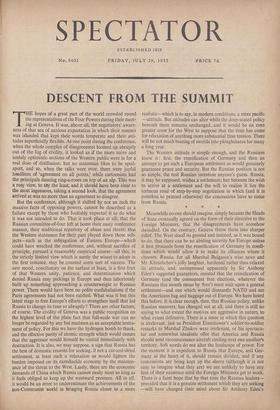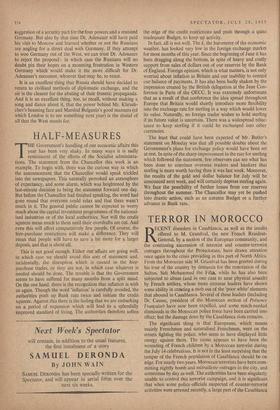DESCENT FROM THE SUMMIT
THE hopes of a great part of the world crowded round the representatives of the Four Powers during their meet- ing at Geneva. It was, above all, the negotiators' aware- ness of that sea of anxious expectation in which their summit was islanded that kept their words temperate and their atti- tudes superficially flexible. At one point during the conference, when the whole complex of disagreement loomed up abruptly out of the fog of civility, it looked as if the more naive and unduly optimistic sections bf the Western public were in for a real dose of disillusion; but no statesman likes to be spoil- sport, and so, when the talks were over, there were joyful headlines of 'agreement on all points,' while cartoonists had the principals dancing ring-a-roses on top of an alp.. This was a rosy view. to sky the least, and it should have been clear to the most ingenuous, taking a second look, that the agreement arrived at was no more than an agreement to disagree.
But the conference, although it shifted by not an inch the massive facts of opposing powers, cannot be described as a failure except by those who foolishly expected it to do what it was not intended to do. That it took place at all; that the Russian committee-of-four left at home their nasty conference manner, their traditional repertory of abuse and threat; that the Western statesmen for their part played down those sub- jects—such as the subjugation of Eastern Europe—which could have wrecked the conference, and, without sacrifice of principle, pursued a reasonably empirical course—all this, in the strictly limited view which is surely the wisest to adopt in the first instance, may be counted some sort of success. The new mood, conciliatory on the surface at least, is a first fruit of that Western unity, patience, and determination which denied Russia easy pickings in Europe and then laboriously built up something approaching a counterweight to Russian power. There would have been no polite confabulations if the Paris agreements had not been ratified. What was it but this latest stage in free Europe's efforts to strengthen itself that led Russia to change its tune so abruptly? There are other factors, of course. The civility of Geneva was a public recognition on the highest level of the plain fact that full-scale war can no longer be regarded by any but madmen as an acceptable instru- ment of policy. For this we have the hydrogen bomb to thank, and the effective parity of atomic strength which would ensure that the aggressor would himself be visited immediately with destruction. It is also, we may suppose, .a sign that Russia has the best of domestic reasons for seeking, if not a cut-and-dried settlement, at least such a relaxation as would lighten the burden imposed on its ramshackle economy by the mainten- ance of the threat to the West. Lastly, there are the economic demands of China which Russia cannot easily meet so long as it feels obliged to keep up the westward pressure. All in all, it would be an error to underestimate the achievements of the non-Communist world in bringing Russia closer to a more realistic—which is to say, in modern conditions. a more pacific —attitude. But attitudes can alter while. the deep-seated policy beneath them remains unchanged, and it would be an even greater error for the West to suppose that the time has come for relaxation of anything more substantial than tension. There will be not much beating of swords into ploughshares for many a long year.
The Western attitude is simple enough, and the Russians know it : first, the reunification of Germany and then an attempt to get such a European settlement as would genuinely guarantee peace and security. But the Russian position is not so simple, the real Russian intention anyone's guess. Russia, it may be supposed, wishes a settlement; but between the wish to arrive at a settlement and the will to realise it lies the toituous road of step-by-step negotiation in which (and it is pointless to pretend otherwise) the concessions have to come from Russia.
Meanwhile no one should imagine, simply because the Heads of State eventually agreed on the form of their directive to the Foreign Ministers, that the disagreements have somehow dwindled. On the contrary, Geneva threw them into sharper relief. The West stood its ground and insisted, as it was bound to do, that there can be no abiding security for Europe unless it first proceeds from the reunification of Germany in condi- tions which would allow it to make its alliances where it chooses. Russia, for all Marshal Bulganin's wise saws and Mr. Khrushchev's jolly laughter, hardened rather than relaxed its attitude, and, unimpressed apparently by Sir Anthony Eden's suggested guarantees, insisted that the reunification of Germany (and the consequent free elections, whatever the Russians this month mean by 'free') must wait upon a general settlement—and one which would dismantle NATO and see the Americans bag and baggage out of Europe. We have heard this before. It is clear enough, then, that Russian policy, unlike Russian manners, has changed not at all, and there is still no saying to what extent the motives are aggressive in nature, to what extent defensive. There is a sense in which this question is irrelevant, just as President Eisenhower's soldier-to-soldier remarks to Marshal Zhukov were irrelevant, or his spectacu- lar and somewhat idealistic offer that America and Russia should send reconnaissance aircraft circling over one anothees territory. Soft words do not alter the landscape of power. For the moment it is expedient to Russia that Europe, and Ger- many at the heart of it, should remain diVided; and if any concessions are being kept up the sleeve (although it is not easy to imagine what they are) we are unlikely to have any hint of their existence until the Foreign Ministers get to work. There is a faint hope that by that time the Russian leaders— provided that it is a genuine settlement which they are seeking —will have changed their mind about Sir Anthony Eden's suggestion of a security pact for the four powers and a reunited Germany. But also by that time Dr. Adenauer will have paid his visit to Moscow and learned whether or not the Russians are angling for a direct deal with Germany. if they attempt to woo Germany out of the West, we can trust Dr. Adenauer to reject the proposal : in which case the Russians will no doubt pin their hopes on a mounting frustration in Western Germany which' would make it the more difficult for Dr. Adenauer's successor, whoever that' may be, to resist.
It is an excellent thing that Russia should have decided to return to civilised methods of diplomatic exchange, and the air is the cleaner for the abating of their frenetic propaganda. And it is an excellent thing, too, to recall, without making a song and dance about it, that the power behind Mr. Khrush- chev's beaming face and Marshal Bulganin's good manners (of which London is to see something next year) is the denial of all that the West stands for.



































 Previous page
Previous page